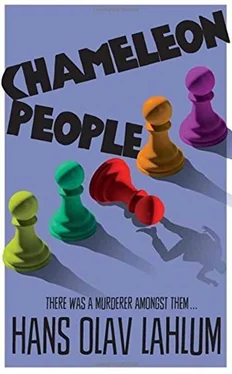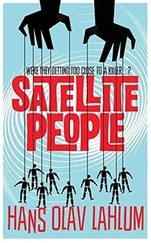I told them that I had to take the confession with me and that it would be up to the Fredriksen family and the potential new owner to decide what they wanted to do about the matter. I thanked them for their statements and requested that they both stay in town until the investigation into Fredriksen’s death had been closed.
They both nodded again. When I looked back from the doorway, Svendsen had put his arm around Jørgensen, which produced a small smile from the office manager. And I thought to myself that in the midst of all this tragedy, it was a touching picture of care and love between two people. I then again thought that one or both of these two hard-pressed men could have committed murder. I closed the door behind me and left without looking back.
It was a busy day for both me and the other people involved in the case. At two minutes past one, I was back in my office. Four minutes later, Ane Line Fredriksen came striding in at an admirable pace.
‘Sorry it took a bit longer than expected to find a babysitter. The lack of childcare in this city is a scandal – something needs to be done about it. What have you got to tell me?’ she said, without drawing breath. Then she sat down, without me having asked, and leaned across the desk towards me.
Once again, I thought that there was something refreshingly enthusiastic, direct and dynamic about the thirty-year-old redhead. Dressed in jeans and a green hand-knitted sweater, she seemed remarkably unaffected by the fact that she had lost both her father and her sister in the past five days, and as a result was about to inherit a fortune.
I tried to start gently by thanking her for coming at such short notice, and by asking which party she worked for.
She smiled cheerfully, pointed at her red hair and replied: ‘The Socialist People’s Party. I inherited my political zeal from Father, but not my political views. I doubt that there is anyone in our family who agrees politically, in fact. I’m sure Mother always voted the same as Father, but she is actually totally disinterested in politics. Johan refuses to say who he votes for, but surely it’s Conservative, and Vera always leaned towards the Liberals, or something equally tame in the centre.’
I could not help but ask if she knew my fiancée, Miriam Filtvedt Bentsen, through the SPP. She nodded energetically.
‘Yes, of course I do. Everyone knows Miriam – she more or less lives in the party office. Oh, so you are the mysterious boyfriend she never wants to talk about? I tried to ask her last year if she had a boyfriend, and she just said yes and stopped there. How exciting. How did you meet?’
I knew that Miriam did not like to talk about her private life either at university or in the party office, and I understood perfectly why she played down her relationship with a well-known policeman in those circles. So I gave her a simple, short answer and said that it had been in connection with an earlier murder investigation, and it was a long story that she would have to hear another time.
Ane Line Fredriksen looked as though she wanted to hear the long story straightaway. But a natural curiosity can quickly be turned in different directions and she listened intently and almost reverently to my account of the investigation into her father’s murder. Then all of a sudden her eyes brimmed with tears at the mention of her sister.
‘It was of course very sad with Father. But with Vera it is different – tragic. Vera has always been so fragile, physically and mentally. My brother and I had both thought and spoken briefly about the possibility that she would go before us. But then, only a few days after Father… No, it was unexpected and just dreadful. It feels terrible to have lost your only sister in that way without the chance to say goodbye.’
I used the opportunity to ask quickly when she had last spoken to her sister.
‘The evening before – and then we only spoke about Father’s funeral, the inheritance, practical things like that. It was a strange evening. Mother was distant and close to tears every time Father was mentioned. Johan was relatively together, but really only concerned with making a decision about the takeover that was weighing so heavily on him. We did not speak on the day she died. Though I do think she tried to call me.’
I immediately asked how she could know that.
‘There was a phone call at home around three, but I did not manage to pick up on time. Of course, I don’t know that it was Vera, but it was not Mother, Johan or my ex. If it was anyone else, they didn’t call back again later.’
I jumped slightly in my chair. Then I said that the timing fitted well with the phone calls that we knew had been made from the hotel.
This upset Ane Line Fredriksen even more. She had no idea what her sister might have wanted to say to her – and no explanation as to why her sister appeared to have called her and not her brother or mother.
Ane Line Fredriksen spoke quickly and was visibly upset; it felt possible that she might now give away secrets. So I pushed on.
‘The relationship between you and your sister was not the best, was it?’
This worked. She talked even faster and got even more upset. ‘Who said that? My mother? My brother? Both of them?’
The way Ane Line Fredriksen looked at me felt almost threatening. I answered with a counter-attack and said that I was unfortunately not at liberty to say, but that I would like to have an answer for the purposes of the investigation.
‘My family need to get a grip, they really do. I cared more about Vera and rang her more frequently than they both did. Mother only had eyes for Father, and my brother only had eyes for the mirror. It is true that we have argued a bit recently, yes. Smart girls like Vera have to be braver and stand up for their rights if there is ever going to be any equality in society. I told her as much, and said that she must not give any money to that slippery boyfriend of hers. She was indifferent about the former and vehemently disagreed with the latter. So yes, we had argued a bit recently, but no, we did not hate each other.’
I still liked Ane Line Fredriksen the best of the remaining members of the Fredriksen family. I thought she was a refreshingly engaging and honest person. But I felt less convinced of her honesty right now. Ane Line Fredriksen had just earned roughly thirty million kroner as a result of the deaths this week, she had argued with her sister, she was probably one of the people her sister had tried to contact a few hours before her death, and she clearly had a lively temperament.
So I said that as a matter of procedure I had to ask her if she had an alibi for the time of both her father’s and sister’s deaths.
She looked as though she was in danger of exploding. She shot forwards in her chair and boomed: ‘For goodness’ sake, man! Are you accusing me of killing my father and Vera?’
I was slightly taken aback by her reaction, but replied with measured calm: ‘For the moment, I am not accusing anyone of having killed either of them. I am trying to find out who did, and it is then a matter of procedure to ask everyone in the victim’s closest family for an alibi. It is clearly written in all police rules and guidelines.’
Strictly speaking, the latter was a slight exaggeration, but it did the trick perfectly. Ane Line Fredriksen calmed down in record time. She leaned back in her chair again and answered in a much quieter, slower voice: ‘Very well, if it is standard practice and included in the rules. When Father was killed on Saturday evening, I was at home with my daughter. She went to bed at seven, after which I sat alone working on some party matter until the priest came to my door at eleven. When Vera died, I was at home all day with my daughter until I took her to my ex-husband and his parents at around three o’clock. Then I drove home again and was on my own until a friend came to see me at five.’
Читать дальше












